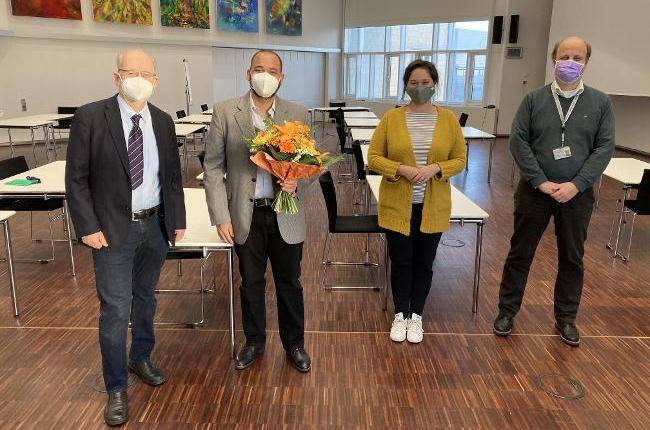Research Award from the Biological Society 2020 Received for New Findings in Food Allergies
On 8 December 2020, Dr Frank Blanco received the sponsorship award of the Biological Society (Biologischer Verein e.V.) for his fundamental research on the pathomechanism of allergic enteritis (AE), an inflammation of the intestine caused by food allergies. In the research group “Molecular Allergy” in responsibility of the vice president of the Paul-Ehrlich-Institut, Professor Stefan Vieths, Dr Blanco not only described previously unknown immunological processes of AE but also checked possible therapeutic approaches. For this purpose, Dr Blanco developed complex allergy models, both in vitro and in the mouse model. “The Biological Society’s aim is to support experimental basic research, thus paving the way for the development of possible therapies. With his work on the pathomechanism of allergic enteritis, Dr Blanco is contributing to this aim to a major extent,”
said Adjunct Professor Andreas Hofmann, chairman of the organisation.
 Adjunct Professor Andreas Hofmann (Chairman), Dr Frank Blanco (Award Winner), Professor Zoe Waibler, Professor Ger van Zandbergen (Board of the Biological Society)
Adjunct Professor Andreas Hofmann (Chairman), Dr Frank Blanco (Award Winner), Professor Zoe Waibler, Professor Ger van Zandbergen (Board of the Biological Society)
On 8 December 2020, Dr Frank Blanco from Venezuela received the Award for the Advancement of the Biological Society (Förderpreis des Biologischen Vereins e.V.) 2020 for his Ph.D. thesis in the Research Group “Molecular Allergy” assigned to the vice president of the Paul-Ehrlich-Institut, Professor Stefan Vieths. The Ph.D. thesis was funded by the German Academic Exchange Service (Deutscher Akademischer Austauschdienst, DAAD). The scientist not only studied pathomechanisms of AE, which were previously unknown, but also researched on questions regarding possible treatment. No causal treatments of allergic enteritis (AE) caused by food allergies are yet available.
In the mouse model, Blanco clarified complex relationships of the disease, which were previously unknown. For this purpose, he established an experimental allergy model and a mouse model. The aims (targets) related to the pathogenesis were identified by the scientist via microarray analyses. Blanco was able to show that the chemokine receptor CCR8 and its ligand, chemokine CCL1 played an essential role in the pathogenesis of enteritis. Eosinophil granulocytes, which migrate into the intestine tissue were already known to trigger disease. What was up to now unknown was the role of the CCR8 receptor as the driver for this migration process. Studies with knockout mice in which the gene for CCR8 was switched off point to the fact that CCR8 is involved in the development of clinical symptoms. However, switching off CCR8 did not turn out to be a strategy sufficient to suppress AE – other inflammatory cells are upregulated. This shows: CCR8 antagonists discussed as treatment option are not a suitable therapy strategy in allergic diseases.
About the Biological Society
Founded by the Frankfurt doctor, Ferdinand Blum in December 1919, the Biological Society (Biologischer Verein e.V.) is able to look back upon a history full of change and long tradition as a scientific organisation. Its most important aim is the progress of science and research in the field of biology, in particular, in the field experimental research. The findings gains can be of benefit in medicine or pharmacy. The organisation provides a varied programme of services to its members and interested parties from the public. The focus of these services is on scientific content both for specialists and for laypeople. The Biological Society is traditionally in close exchange with the scientific institute Paul-Ehrlich-Institut and the chemotherapeutic research institute Georg-Speyer-Haus.
Publication
Blanco-Pérez F, Kato Y, Gonzalez-Menendez I, Laiño J, Ohbayashi M, Burggraf M, Krause M, Kirberg J, Iwakura Y, Martella M, Quintanilla-Martinez L, Shibata N, Vieths S, Scheurer S, Toda M (2019): CCR8 leads to eosinophil migration and regulates neutrophil migration in murine allergic enteritis.
Sci Rep 9: 9608.
Text



